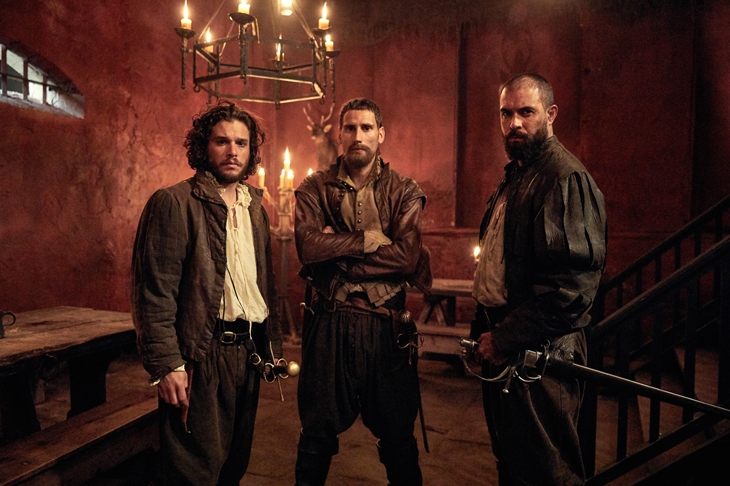The opening of Gunpowder (BBC1, Saturdays) was just about the most knuckle-gnawingly tense ten minutes I’ve ever seen on TV.
It’s 1603 and James I is on the throne. At the Warwickshire great house of Baddesley Clinton, a group of aristocratic Catholics, including Robert Catesby (Kit Harington) and Anne Vaux (Liv Tyler), are celebrating Mass illicitly when a party of armed men begins hammering at the door.
Quickly, the various guerrilla priests — a senior Jesuit Henry Garnet and two young acolytes — are bundled into hiding, two in a priest hole set behind some panelling, one in a chest. The search party enters, led by an implacable witchfinder-general type who pursues his task with sadistic relish and grim efficiency. As the priests cower, their terror palpable, the search party sets about measuring the house within and without to see if there is any discrepancy in the dimensions.
And, yes, there is! But before the priest hole can be discovered, the acolyte in the chest — a pretty teenager with flowing curly locks — distracts the searchers by accidentally dropping a chalice. Big mistake. First he’ll be tortured. Then — in scenes that, unfortunately, we’re later forced to witness — he will be partially hanged, before he is cut open, still alive, to endure having his entrails unwound and his limbs severed one by one with an axe.
Meanwhile, the dignified lady of the house — one Lady Dorothy Dibdale — takes full responsibility for the illegal priest concealment. This, happily, spares the show’s biggest stars — Jon Snow and Arwen — for the next two episodes but at a terrible cost. Poor Lady D is taken to a scaffold, stripped naked and then laid with a large rock between her spine and the wooden deck, before being crushed to death by a door laden with heavy weights.
At which point — once they’d disposed of their sick bags — many viewers, I imagine, will have reached for Google. How much of this stuff was accurate?
None of it, pretty much. No priests were ever discovered at Baddesley Clinton, where the fictional Lady D was not the châtelaine; Catesby lived elsewhere; and the death-by-crushing was a one-off, atypical of the Jacobean period, and actually conducted in 1586, in Elizabeth’s time, on a hapless Catholic woman called Margaret Clitherow.
Do we care? Well, yes, up to a point. Clearly, there are problems when real historical events are distorted and misrepresented for dramatic purposes; still more so when it’s done for political ones. Scriptwriter Ronan Bennett — Republican sympathiser; ex-parliamentary researcher for Jeremy Corbyn; scion of a devout Northern Irish Catholic family — clearly has an axe to grind.
If the BBC were properly impartial — as of course it isn’t — each epidsode would be preceded by a giant health warning: ‘Massive, anti-English, Republican propaganda alert.’ The script’s implication that the Catholic threat to the English Protestant throne existed mostly in Sir Robert Cecil’s head is clearly absurd when you consider the 50 years leading up to it: Bloody Mary, anyone?
That said, though, it’s absolutely gripping and I’m not sure there’s anyone who could have done a better job than Bennett of bringing this dark, weird period so vividly to life. For a start, because it’s his PhD area of expertise the language is perfectly authentic. When his scheming Cecil (Mark Gattis) enunciates the word ‘addicted’, you’ll find, on checking the etymology, that yes, it was indeed current by the Jacobean era.
Also, like the best historical writers, Bennett understands that such liberties are sometimes necessary for the narrative thrust. In the early 17th century, the idea that your particular Christian sect was worth dying and killing for would have made sense to everyone; for a modern audience, however, it clearly makes sense to portray Catesby more in the manner of a Hollywood-style revenge hero whose family and friends have suffered too much and now its payback time.
What upset me far more this week than the torture scenes in Gunpowder was The Confession Tapes (Netflix). The first two episodes of this documentary concerned a miscarriage of justice so outrageous I could barely endure it to the end. Right now, rotting in maximum-security prisons in Washington state, are two young men, Sebastian Burns and Atif Rafay (19 when they were sentenced in 1994), who patently did not commit the brutal murders — the ‘Bellevue triple homicide’ — for which they were banged up by a dysfunctional justice system. Watch and I think you’ll agree.







Comments